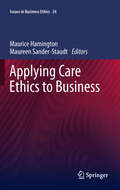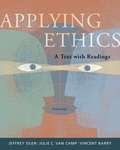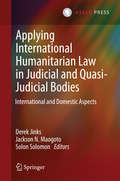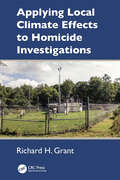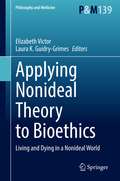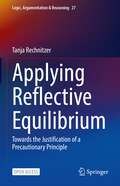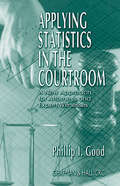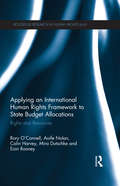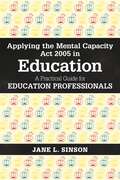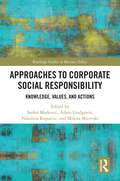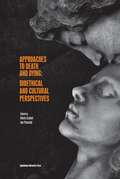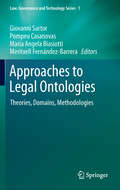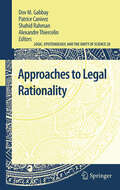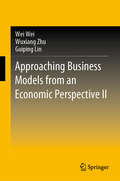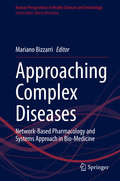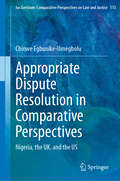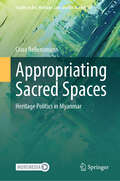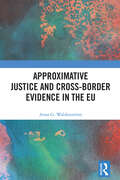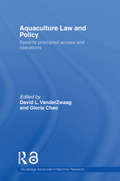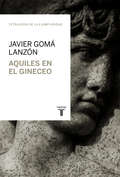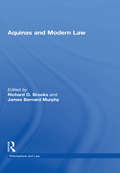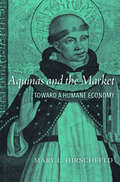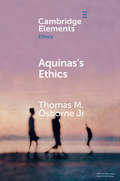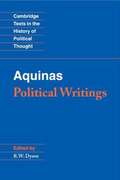- Table View
- List View
Applying Care Ethics to Business (Issues in Business Ethics #34)
by Maureen Sander-Staudt Maurice HamingtonApplying Care Ethics to Business is a multidisciplinary collection of original essays that explores the intersection between the burgeoning field of care ethics and business. Care ethics is an approach to morality that emphasizes relational, particularist, and affective dimensions of morality that evolved from feminist theory and today enjoys robust intellectual exploration. Care ethics emerged out of feminist theory in the 1980's and the greatest contribution to moral analysis among Women' Studies scholars. Today, feminists and non-feminist scholars are increasingly taking care ethics seriously. Applying care to the marketplace is a natural step in its maturity. Applying Care Ethics to Business is the first book-length analysis of business and economic cases and theories from the perspective of care theory. Furthermore, given economic turbulence and the resulting scrutiny of market practices, care ethics provides fresh and timely insight into ideal business values and commitments. In many ways, care ethics' emphasis upon connection and cooperation as well as the growth and well-being of the other make it appear to be the antithesis of the corporate character. Nevertheless, many contemporary theorists question if traditional moral approaches based on autonomous agents is adequate to address a shrinking and interconnected world--particularly one that is marked by global markets. Applying Care Ethics to Business offers a unique opportunity to rethink corporate responsibility and business ethics.
Applying Ethics: A Text With Readings
by Jeffrey Olen Julie C. Van Camp Vincent BarryDiscover the ethical implications and issues surrounding today's most compelling social dilemmas--from genetic engineering and cloning to terrorism and the use of torture--with APPLYING ETHICS: A TEXT WITH READINGS, 11th Edition. <p><p>Framed by the authors' helpful introductions and supported by a variety of readings and cases that reflect both sides of the topics being explored, this best-selling book offers a balanced introduction to ethics today.
Applying Ethics: A Text with Readings (9th edition)
by Jeffrey Olen Julie C. Van Camp Vincent BarryThis book introduces students to ethics via a well-proven formula of engaging commentary, seminal readings, and thought-provoking cases drawn from a wide range of contemporary social debates.
Applying International Humanitarian Law in Judicial and Quasi-Judicial Bodies: International and Domestic Aspects
by Derek Jinks Jackson N. Maogoto Solon SolomonThe work analyzes the impact and implementation of international humanitarian law in judicial and quasi judicial bodies. Moreover, acknowledging the high impact domestic jurisdictions have in the configuration of international law, the book does not rest only in an analysis of the international jurisprudence, but delves also into the question of how domestic courts relate to international humanitarian law issues.
Applying Local Climate Effects to Homicide Investigations
by Richard H. GrantApplying Local Climate Effects to Homicide Investigation presents the concepts behind using local climate and weather records to enhance understanding of criminal cases. While sources of such local climate and weather information varies by country and regions, weather conditions are typically measured at airports or grassy areas as part of a national, regional, or state-wide networks using many different instruments.The information derived from such instruments and weather reporting services and agencies can inform and impact investigations, especially in the case of natural death or homicide cases. The determination of post-mortem interval (PMI) in homicide cases is often based on entomological or anthropological evidence in combination with local climate estimations. Determining the local climate conditions typically requires knowledge of the environmental conditions where the body is found and the conditions where the measurement record was made. Most people recognize that cities are hotter than the surrounding countryside and that lake and coastal shorelines are cooler than fields: all of these comprise local climates. The local climate where a corpse is discovered usually differs from where temperature and humidity measurements are made. Consequently, many investigators and forensic pathologists do not realize the influence that such local temperatures and humidity can have on post-mortem interval determinations.The book focuses on local climate conditions associated with the determination of post-mortem interval (PMI) and gives concepts behind adjusting climate information for local climates at the corpse. In addition, the book will present guidelines for crime scene investigators and lawyers to determine whether or not expert consultation is needed, and whether or not on-site measurements are needed. Most importantly, this book presents tools (data sources and modeling approaches) to guide forensic climatologists conducting forensic climatology work. It offers a basic, working understanding of the influence of the local environment on the local climate for forensic entomologists, forensic anthropologists, crime scene investigators, and lawyers. Numerous case studies are included throughout to show approaches, illustration decision points, and provide an understanding of the various impacts of regional and micro-climates upon decedents and their remains.
Applying Nonideal Theory to Bioethics: Living and Dying in a Nonideal World (Philosophy and Medicine #139)
by Laura K. Guidry-Grimes Elizabeth VictorThis book offers new essays exploring concepts and applications of nonideal theory in bioethics. Nonideal theory refers to an analytic approach to moral and political philosophy (especially in relation to justice), according to which we should not assume that there will be perfect compliance with principles, that there will be favorable circumstances for just institutions and right action, or that reasoners are capable of being impartial. Nonideal theory takes the world as it actually is, in all of its imperfections. Bioethicists have called for greater attention to how nonideal theory can serve as a guide in the messy realities they face daily. Although many bioethicists implicitly assume nonideal theory in their work, there is the need for more explicit engagement with this theoretical outlook. A nonideal approach to bioethics would start by examining the sociopolitical realities of healthcare and the embeddedness of moral actors in those realities. How are bioethicists to navigate systemic injustices when completing research, giving guidance for patient care, and contributing to medical and public health policies? When there are no good options and when moral agents are enmeshed in their sociopolitical viewpoints, how should moral theorizing proceed? What do bioethical issues and principles look like from the perspective of historically marginalized persons? These are just a few of the questions that motivate nonideal theory within bioethics. This book begins in Part I with an overview of the foundational tenets of nonideal theory, what nonideal theory can offer bioethics, and why it may be preferable to ideal theory in addressing moral dilemmas in the clinic and beyond. In Part II, authors discuss applications of nonideal theory in many areas of bioethics, including reflections on environmental harms, racism and minority health, healthcare injustices during incarceration and detention, and other vulnerabilities experienced by patients from clinical and public health perspectives. The chapters within each section demonstrate the breadth in scope that nonideal theory encompasses, bringing together diverse theorists and approaches into one collection.
Applying Reflective Equilibrium: Towards the Justification of a Precautionary Principle (Logic, Argumentation & Reasoning #27)
by Tanja RechnitzerThis open access book provides the first explicit case study for an application of the method of reflective equilibrium (RE), using it to develop and defend a precautionary principle. It thereby makes an important and original contribution to questions of philosophical method and methodology. The book shows step-by-step how RE is applied, and develops a methodological framework which will be useful for everyone who wishes to use reflective equilibrium. With respect to precautionary principles, the book demonstrates how a rights-based precautionary principle can be constructed and defended. The case study succeeds in demonstrating that RE can be successfully applied and puts real constraints on the justification process. This is all the more remarkable as the case study was designed as an open-ended process, without presupposing any specific results. This book will be highly relevant both to people interested in philosophical methodology and epistemology, as well as to researchers who are interested in using philosophical methods and tools and applying them to practical problems.
Applying Statistics in the Courtroom: A New Approach for Attorneys and Expert Witnesses
by Philip GoodThis publication is directed at both attorneys and statisticians to ensure they will work together successfully on the application of statistics in the law. Attorneys will learn how best to utilize the statistician's talents, while gaining an enriched understanding of the law relevant to audits, jury selection, discrimination, environmental hazards, evidence, and torts as it relates to statistical issues. Statisticians will learn that the law is what judges say it is and to frame their arguments accordingly. This book will increase the effectiveness of both parties in presenting and attacking statistical arguments in the courtroom. Topics covered include sample and survey methods, probability, testing hypotheses, and multiple regression.
Applying an International Human Rights Framework to State Budget Allocations: Rights and Resources (Routledge Research in Human Rights Law)
by Colin Harvey Aoife Nolan Rory O'Connell Mira Dutschke Eoin RooneyHuman rights based budget analysis projects have emerged at a time when the United Nations has asserted the indivisibility of all human rights and attention is increasingly focused on the role of non-judicial bodies in promoting and protecting human rights. This book seeks to develop the human rights framework for such budget analyses, by exploring the international law obligations of the International Covenant on Economic, Social and Cultural Rights (ICESCR) in relation to budgetary processes. The book outlines international experiences and comparative practice in relation to economic and social rights budget analysis and budgeting. The book sets out an ICESCR-based methodology for analysing budget and resource allocations and focuses on the legal obligation imposed on state parties by article 2(1) of ICESCR to progressively realise economic and social rights to 'the maximum of available resources'. Taking Northern Ireland as a key case study, the book demonstrates and promotes the use of a ‘rights-based’ approach in budgetary decision-making. The book will be relevant to a global audience currently considering how to engage in the budget process from a human rights perspective. It will be of interest to students and researchers of international human rights law and public law, as well as economic and social rights advocacy and lobbying groups.
Applying the Mental Capacity Act 2005 in Education: A Practical Guide for Education Professionals
by Jane L. SinsonThis straightforward book explains the introduction of the Mental Capacity Act 2005 (MCA) and its code of practice (COP) as part of the Children and Families Act 2014 and the accompanying SEND COP in England. This is the first comprehensive book to explain to education professionals the legal requirement to follow the MCA COP and SEND COP guidelines when formally considering a young person's (16 - 25) capacity to make decisions about their education. Using education-focussed case studies throughout to illustrate key points, this practical guide explains the MCA five principles, defines the term 'mental capacity' and clarifies the circumstances in which a young person would lack capacity to make a decision. It describes when a capacity assessment is likely to be required and presents a step-by-step guide to undertaking a capacity assessment. This is the essential guide to the MCA for FE college tutors, post 16 teachers, specialist teachers, local authority SEN officers and educational psychologists.
Approaches to Corporate Social Responsibility: Knowledge, Values, and Actions (Routledge Studies in Business Ethics)
by Adam Lindgreen Nikolina Koporcic Stefan Markovic Milena MicevskiFollowing recent growth of ethical consumerism, customers and other stakeholders increasingly pressure organizations to be socially responsible and minimize their negative impact on the environment. Accordingly, a plethora of firms have integrated corporate social responsibility (CSR) at the center of their business strategies and actions. Whilst this has resulted in many firms meeting their broader responsibilities toward society and the environment, some firms have used CSR in a manipulative and insincere way. As stakeholders become aware of such misuse of CSR, largely thanks to the rapid evolution of information technologies, they start to penalize firms by spreading negative word of mouth about them, and specifically about their CSR knowledge, values, and actions. Now, more than ever before, stakeholders are increasingly critical and cautious in their assessments of firms’ CSR knowledge, values, and actions. On this background, this edited volume sheds light on different internal and external perspectives spanning CSR knowledge, values, and actions. It shares theoretical, practical, and case-based insights on the broader topic and can be of interest to researchers, academics, practitioners, and advanced students in the fields of CSR and business ethics, knowledge management, strategy, and marketing.
Approaches to Death and Dying: Bioethical and Cultural Perspectives
by Jan Piasecki Marta SzabatThe book Approaches to Death and Dying: Bioethical and Cultural Perspectives, edited by Marta Szabat and Jan Piasecki, is part of a still too narrow catalogue of works devoted to end-of-life themes. The volume consists of eleven articles arranged in four parts corresponding to a broad range of issues: law, ethics, philosophy, and cultural studies. The arrangement of the book is thus constructed around various perspectives upon which any reflection on death and dying must be based. This is perhaps indicative of how difficult it is to adopt an unambiguous attitude towards death–modernity, which introduces a multitude of possible choices and decisions regarding our own bodies, has enhanced individualism but at the same time done away with the order provided by old customs, cultural arrangements, strategies towards the inevitable and the power exerted by that order.
Approaches to Legal Ontologies: Theories, Domains, Methodologies (Law, Governance and Technology Series #1)
by Giovanni Sartor Mariangela Biasiotti Meritxell Fernández-Barrera Pompeu CasanovasThe book provides the reader with a unique source regarding the current theoretical landscape in legal ontology engineering as well as on foreseeable future trends for the definition of conceptual structures to enhance the automatic processing and retrieval of legal information in the Semantic Web framework. It will thus interest researchers in the domains of the SW, legal informatics, Artificial Intelligence and law, legal theory and legal philosophy, as well as developers of e-government applications based on the intelligent management of legal or public information to provide both back-office and front-office support.
Approaches to Legal Rationality (Logic, Epistemology, and the Unity of Science #20)
by Dov M. Gabbay Patrice Canivez Shahid Rahman Alexandre ThiercelinLegal theory, political sciences, sociology, philosophy, logic, artificial intelligence: there are many approaches to legal argumentation. Each of them provides specific insights into highly complex phenomena. Different disciplines, but also different traditions in disciplines (e.g. analytical and continental traditions in philosophy) find here a rare occasion to meet. The present book contains contributions, both historical and thematic, from leading researchers in several of the most important approaches to legal rationality. One of the main issues is the relation between logic and law: the way logic is actually used in law, but also the way logic can make law explicit. An outstanding group of philosophers, logicians and jurists try to meet this issue. The book is more than a collection of papers. However different their respective conceptual tools may be, the authors share a common conception: legal argumentation is a specific argumentation context.
Approaching Business Models from an Economic Perspective II
by Wuxiang Zhu Wei Wei Guiping LinThis book breaks the boundaries of the single enterprise, proposing the symbiotic business model, and discussing business model design engineering as well as other new concepts, methods and ideas. Business models are not only dependent on business intuition, but also on systematic design and continuous upgrade. This book presents qualitative methods, such as the theory and principles of business model design; quantitative methods, for example the business-model based "Accounting Method"; and the "Financial Analysis Method," based on the business ecosystem. These methods help entrepreneurs and managers design better business models to further develop enterprises and make them more successful.
Approaching Complex Diseases: Network-Based Pharmacology and Systems Approach in Bio-Medicine (Human Perspectives in Health Sciences and Technology #2)
by Mariano BizzarriThis volume – for pharmacologists, systems biologists, philosophers and historians of medicine – points to investigate new avenues in pharmacology research, by providing a full assessment of the premises underlying a radical shift in the pharmacology paradigm. The pharmaceutical industry is currently facing unparalleled challenges in developing innovative drugs. While drug-developing scientists in the 1990s mostly welcomed the transformation into a target-based approach, two decades of experience shows that this model is failing to boost both drug discovery and efficiency. Selected targets were often not druggable and with poor disease linkage, leading to either high toxicity or poor efficacy. Therefore, a profound rethinking of the current paradigm is needed. Advances in systems biology are revealing a phenotypic robustness and a network structure that strongly suggest that exquisitely selective compounds, compared with multitarget drugs, may exhibit lower than desired clinical efficacy. This appreciation of the role of polypharmacology has significant implications for tackling the two major sources of attrition in drug development, efficacy and toxicity. Integrating network biology and polypharmacology holds the promise of expanding the current opportunity space for druggable targets.
Appropriate Dispute Resolution in Comparative Perspectives: Nigeria, the UK, and the US (Ius Gentium: Comparative Perspectives on Law and Justice #113)
by Chinwe Egbunike-UmegboluThis book explores the various types of Appropriate Dispute Resolution (ADR) applied in Nigeria, the UK, and the US. It critically examines the effectiveness of mediation, arbitration, restorative justice, collaborative law, and online dispute resolution (ODR) in settling disputes or conflicts, while also demonstrating the benefits of ADR and multi-door courthouses (MDCs). The book provides a concise introduction to the resolution of disputes or conflicts in Africa prior to the advent of colonial rule. It suggests that a ‘legal transplant’ can also take place from a less complex society to a more complex one, contrary to the general belief that legal transplants usually proceed from a more complex society to a less complex one.The book aims to help people understand ADR mechanisms and the advantages of settling disputes using means other than litigation. It presents Traditional African Methods of Settling Disputes (TAMSD), Early Dispute Resolution (EDR), arbitration, negotiation, ODR, collaborative law, restorative justice, conciliation, ombuds, and early neutral evaluation as viable alternatives. It also highlights the need for clinical legal education and effective messaging that highlights the benefits of ADR compared to traditional litigation. In turn, it analyses the use of ADR, especially mediation and collaborative law, to settle disputes in criminal law, restorative justice, employment law, and business and human rights due diligence/violation cases. Further, the book demonstrates that criminal matters are now under the scope of ADR via Restorative Justice Door.The book discusses the skills, techniques, and relevant statutory frameworks for each field of Appropriate Dispute Resolution and provides national and international examples of the application of the relevant principles. Addressing the fields of Appropriate Dispute Resolution (ADR), criminal law, civil law, business management, psychology, employment law, humanresource management, and African studies, it will appeal to a wide readership.
Appropriating Sacred Spaces: Heritage Politics in Myanmar (Studies in Art, Heritage, Law and the Market #10)
by Clara RellensmannThe book provides deep insights into heritage politics in Myanmar on the basis of the conservation history of Bagan and its entanglement in national politics. It particularly investigates the heritage practice of the dictatorial regime that ruled Myanmar from 1988 to 2011 and highlights the implications of both the reconciliation politics of Aung San Suu Kyi’s NLD government (2016-2020) and the UNESCO World Heritage System. The book examines the function of Bamar-Buddhist architecture in the spatial strategy of the 1988-2011 regime and its nation-building efforts. With a focus on the historic site of Bagan, included on the World Heritage List in 2019, and the “Adopt-a-Pagoda Program” that was implemented at the site from 1995 to 2011 under authoritarian rule, the book provides a detailed account of Bagan’s physical transformation and its political significance for national politics at the time. It offers a historical comparison of the heritage politics of Myanmar’s most recent transitional governments (2011-2020) pointing out the particularities of the country’s institutionalized heritage practice and one-sided nation-building strategy. Both have contributed to continued ethnic conflicts that are generally considered to be the world’s longest civil war. In the renewed dictatorial context of Myanmar since February 1, 2021, the research presented in the book helps to understand the roots of the new regime's heritage practice and national imagination. In addition to these insights into Myanmar’s heritage politics, the book addresses shortcomings of the World Heritage system with regard to the treatment of sacred sites in authoritarian and post-authoritarian contexts, an aspect that to date has been largely neglected in cultural heritage policy debates across the globe.
Approximative Justice and Cross-Border Evidence in the EU
by Anna G. WaldenströmThis book confronts the difficulties raised by cross-border evidence in order to propose a new understanding of justice as approximative.Can there be any common sense of justice across the European Union (EU)? This book takes up this question which is raised directly in cases where the understanding of cross-border evidence encounters national and linguistic differences. The interpretive challenges this introduces impact the possibility of justice in a way that, the book argues, cannot be resolved with recourse to some ideal of harmonization that would simply flatten these differences. Rather, these cases – taken here from Sweden and France – raise a practical, but also a theoretical, question about how justice can be done. In response, the book draws on contemporary theorizations of justice to argue against a common sense of justice in the sense of what would be a correct legal judgment. In its place, the book elaborates an idea of justice that maintains, rather than collapsing, the differences presented in cases of cross-border evidence; and which therefore aims to be ‘approximative,’ or ‘good enough,’ rather than simply correct.This book will be of interest to readers in legal theory, socio-legal studies, comparative law and European Union law.
Aquaculture Law and Policy: Towards principled access and operations (Routledge Advances in Maritime Research)
by Gloria Chao David L. VanderZwaagThe aquaculture industry is fast expanding around the globe and causing major environmental and social disruptions. The volume is about getting a 'good governance' grip on this important industry. The book highlights the numerous law and policy issues that must be addressed in the search for effective regulation of aquaculture. Those issues include among others: the equitable and fair assignment of property rights; the design of effective dispute resolution mechanisms; clarification of what maritime laws apply to aquaculture; adoption of a proper taxation system for aquaculture; resolution of aboriginal offshore title and rights claims; recognition of international trade law restrictions such as labeling limitations and food safety requirements; and determination of whether genetically modified fish should be allowed and if so under what controls. This book will appeal to a broad range of audiences: undergraduate and postgraduate students, academic researchers, policy makers, NGOs, practicing lawyers and industry representatives.
Aquiles en el Gineceo (Tetralogía de la Ejemplaridad)
by Javier Gomá LanzónAquiles en el gineceo cuenta el proceso subjetivo de formación de la ejemplaridad. Sirviéndose de un mito griego presenta los dos estadios que debe recoger el yo para convertirse en un individuo ejemplar. Aquiles pasó su adolescencia en un gineceo siendo inmortal como un dios y en determinado momento lo abandonó rumbo al campo de batalla de Troya donde sabía que iba a morir. ¿Por qué tomó esta decisión? Elige ser mortal porque la mortalidad es el precio que debe pagar por llegar a ser verdaderamente individual y merecer el título del mejor de los hombres. Todos nosotros recorremos ese mismo camino del gineceo a Troya y, como Aquiles, debemos aprender a ser mortales para ser individuales. Cada uno de los títulos de esta tetralogía es autónomo y de lectura independiente y al mismo tiempo los cuatro forman parte de un plan unitario en torno a la idea de la ejemplaridad: su historia y su teoría general, su formación subjetiva, su aplicación en la esfera política y su relación con la esperanza.
Aquinas and Modern Law (Philosophers And Law Ser.)
by JamesBernard MurphyThis volume collects some of the best recent writings on St. Thomas‘s philosophy of law and includes a critical examination of Aquinas‘s theory of the relation between law and morality, his natural law theory, as well as the modern reformulation of his approach to natural rights. The volume shows how Aquinas understood the importance of positive law and demonstrates the modern relevance of his writings by including Thomistic critiques of modern jurisprudence and examples of applications of Thomistic jurisprudence to specific modern legal problems such as federalism, environmental policy, abortion and euthanasia. The volume also features an introduction which places Aquinas‘s writings in the context of modern jurisprudence as well as an extensive bibliography. The volume is suited to the needs of jurisprudence scholars, teachers and students and is an essential resource for all law libraries.
Aquinas and the Market: Toward a Humane Economy
by Mary L. HirschfeldEconomists investigate the workings of markets and tend to set ethical questions aside. Theologians often dismiss economics, losing insights into the influence of market incentives on individual behavior. Mary L. Hirschfeld bridges this gap by showing how a humane economy can lead to the good life as outlined in the thought of St. Thomas Aquinas.
Aquinas's Ethics (Elements in Ethics)
by Thomas M. Osborne JrThis Element provides an account of Thomas Aquinas's moral philosophy that emphasizes the intrinsic connection between happiness and the human good, human virtue, and the precepts of practical reason. Human beings by nature have an end to which they are directed and concerning which they do not deliberate, namely happiness. Humans achieve this end by performing good human acts, which are produced by the intellect and the will, and perfected by the relevant virtues. These virtuous acts require that the agent grasps the relevant moral principles and uses them in particular cases.
Aquinas: Political Writings
by Thomas Aquinas R. W. DysonThomas Aquinas (1225-1274) is an extremely influential figure in the history of Western thought and the Catholic church. In this major addition to the Cambridge Texts in the History of Political Thought series, Robert Dyson has translated texts by Aquinas that reflect the complete range of his thinking, and clearly show his development of a Christian version of the philosophy of Aristotle. His translations are supported by brief biographies, notes for further reading and a concise critical introduction.
